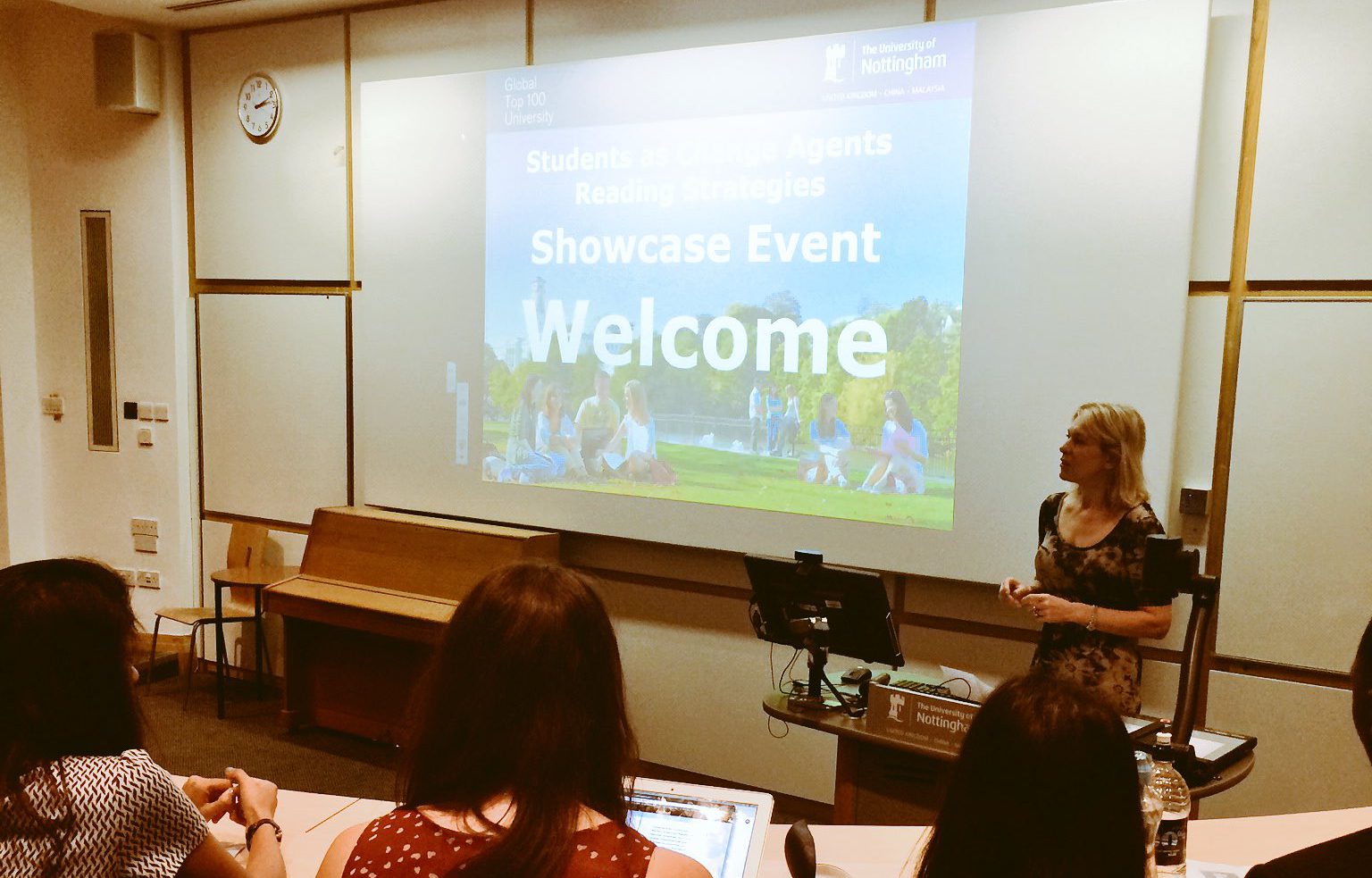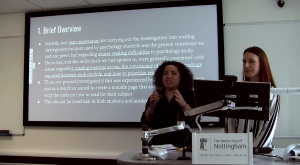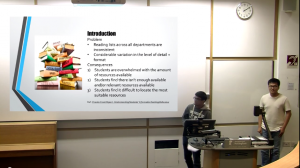
August 1, 2017, by Ian Kingsbury
Helping students develop a reading strategy
The first in a series of three blogs looking at themes arising from ‘reading strategies’ projects commissioned by LRLR under the Students as Change Agents (SACA) programme.
On Thursday 15 June an invited audience – including Professor Sarah O’Hara (PVC for Education and the Student Experience) and Beth Massey (outgoing Students’ Union Education Officer) – assembled at the Arts Centre, University Park, for a ‘Reading strategies showcase’.
Students teams from Psychology, English, Politics and Engineering presented their findings from projects commissioned last year by Libraries, Research and Learning Resources (LRLR) to consider discipline specific challenges and solutions associated with course reading. A key focus of all the projects was to understand the challenges around reading from the students’ perspective.
Knowing what to read
When we talk about ‘reading strategies’, we are essentially referring to how students go about their reading, i.e. what and how they decide to read. The central question for the Reading Strategies SACA projects we commissioned was ‘how do students get started with a reading strategy when there is so much information available to them?’
The Engineering student project looked at their fellow students’ experience of online reading lists. A survey revealed that students find it a challenge to find their reading lists, perhaps due to inconsistency of formats, with some hard copy and some online. There was also a strong sense that students want more help with prioritising their reading. A survey run by the project team revealed a preference among Engineering students for a physical book over an e-resource. This prompted an interesting discussion with the Politics students who seemed far more comfortable with online resources.
Among the project recommendations were for all teaching staff to make their reading lists more consistent, including using the online route and ensuring there is a link in Moodle to the online list. A best practice guide was recommended as a good means of achieving this. The Engineering project team also emphasised that online reading lists are a key tool for the library to ensure we have enough of the right books or digital resources.
Within LRLR we are aware of the importance of providing good online reading lists, and to that end we offer a Reading List Support Service through which we support staff in creating new online reading lists, or maintaining and updating existing ones.
Tackling inconsistency

Like their Engineering counterparts, Psychology students tackle inconsistent Moodle reading lists with additional help and guidance.
Like their Engineering counterparts, the Psychology students tackled inconsistent Moodle reading lists with additional help and guidance.
The Psychology project also tackled the issue of knowing what to read, specifically how to help new undergraduates make sense of reading lists in Moodle. As with the Engineering project, the main findings were a need for greater consistency across modules and help with prioritisation. The project team conducted an audit of Psychology Moodle reading lists, which they backed up with a survey answered by 73 students. The feedback from the survey confirmed what the reading list audit suggested – consistency is an issue. Students reported feelings of stress and anxiety regarding how to tackle and prioritise wider reading. In light of this, the need for more guidance and direction was a key recommendation.
In response the team produced a Moodle page, accessible to all Psychology students (and lecturers) which provides tips and guidelines on how to handle reading for the various modules. They also plan to draft best practice guidelines for lecturers on how to improve their online reading lists.
Strategies not spoons
Professor Sarah Speight, academic lead for the Transforming Teaching Programme, closed the event by observing that we all have a lot of assumptions about student reading strategies, but we need to be more explicit in the help and direction we provide. Sarah reinforced that, far from spoon-feeding students, the projects have highlighted a need to better equip them with the strategies, resources and support they need to succeed in their studies.
SACA is open to all students, across all years and campuses. Through projects, SACA enables students to make a real impact on teaching and learning. As well as the opportunity to make a positive change that enhances the student experience, SACA students also develop valuable skills for employability, such as project management, communication and problem-solving.
The University’s recent success in attaining Gold status in the new Teaching Excellence Framework (TEF) was, in part, thanks to SACA which received special mention from the TEF awarding panel.
Be the change you want to see
If you are interested in becoming involved in the Students as Change Agents Programme, see their website for more information. You can also email them directly at changeagents@nottingham.ac.uk or follow them on Twitter @UoNChangeAgents.
Useful links
Reading strategies project delivers guide “for students, by students” – the next blog in this series
No comments yet, fill out a comment to be the first


Leave a Reply